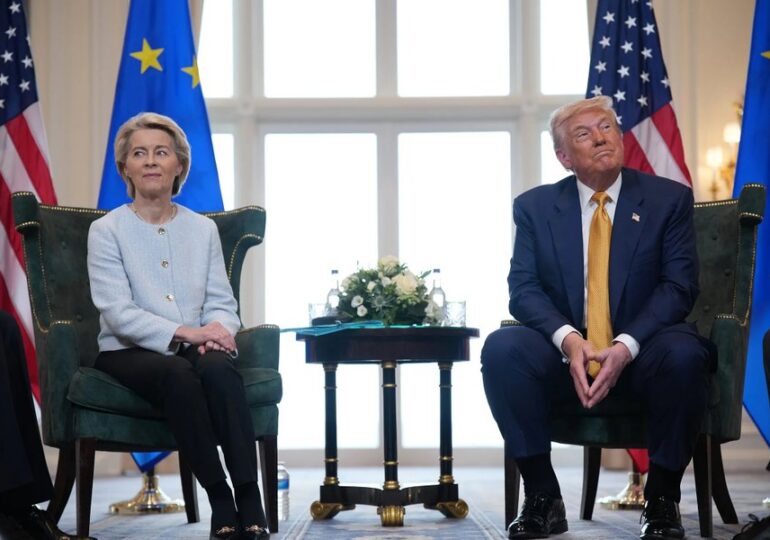President Donald Trump announced that the United States and the European Union have reached a framework agreement for a trade partnership after a meeting of about 40 minutes with the President of the European Commission, Ursula von der Leyen, on Sunday at his Turnberry golf resort in Scotland.
„We have reached an agreement. It’s a good deal for everyone. It solves a lot of things and it was an excellent decision. It will bring us closer… it is, in a way, a partnership,” Trump stated.
The President of the European Commission, Ursula von der Leyen, described the agreement as "an important deal, a huge deal," which will bring "stability" and "predictability."
"The two largest economies should have a fair trade flow," she said.
Today's announcement marks the end of four months of tough negotiations between Washington and Brussels and eliminates the prospect of a transatlantic trade war with negative effects.
Details about the agreement
The agreement provides for a base tariff of 15% for most EU exports to the US, limiting the application of a higher customs duty on European goods sold in the American market.
Prior to this, Washington had threatened a 30% tariff in the absence of an agreement. However, this tariff is higher than the one applied before Trump came to power, and a 50% duty remains valid for steel exports, which represents a setback for this industry, as reported by The Guardian.
Base customs duties of 15% for EU products imported into the United States will apply to the majority of products, including automobiles, semiconductors, and pharmaceuticals, Von der Leyen stated.
But a zero tariff rate has been agreed upon for certain strategic products, including aircraft and aircraft parts, certain chemicals, and certain generic medicines. No decision has been made regarding the rate applicable to wine and spirits, she added.
When asked if she believes that 15% is a good deal for European car manufacturers, Von der Leyen stated, "15% should not be underestimated, but it is the best outcome we could achieve."
The agreement also includes promises of billions of dollars in investments and energy purchases from Brussels.
"The European Union will agree to purchase energy from the United States worth $750 billion," said Trump, as quoted by CNN. "They will agree to invest in the United States $600 billion more than they are currently investing," he added.
According to von der Leyen, the European Union has committed to purchasing liquefied natural gas and nuclear fuel from the US worth $750 billion over a three-year period.
"We still have too much liquefied natural gas from Russia coming in through the back door," she stated.
In his press statements, Donald Trump also mentioned that the deal will be "great for cars" and will have a major impact on agriculture.
Context
Trump started discussions with von der Leyen earlier on Sunday, considering the August 1 deadline for concluding a trade agreement.
The framework agreement comes after Trump announced that tariffs for most goods from the EU would be raised from the base threshold of 10% to a level of 30%, starting on August 1. He justified this measure by stating that there is one of the "largest trade deficits" between the United States and the European Union and that an agreement was not reached by the previous deadline of July 9.
Trump reiterated that tariff notification letters had been sent to other US trading partners who failed to reach agreements, and they will be subject to new tariffs on Friday, except for the tariffs applied to steel and aluminum.
"Most of the agreements, except for those for steel and aluminum, have brought us tariffs of 50%," he added.
Also earlier on Sunday, Commerce Secretary Howard Lutnick stated that there would be no further extensions or grace periods after August 1, but that "major economies" can continue trade negotiations with the United States. Lutnick is in Scotland alongside Trump for trade talks with the EU.
Trump, who aims to reshape the global economy and reduce the historic trade deficits of the US, has so far reached agreements with the UK, Japan, Indonesia, and Vietnam, although his administration has not been able to deliver on the promise of "90 agreements in 90 days," as reported by Reuters.

